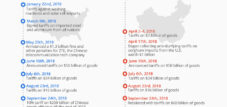Russia | Trump needs the EU for a dual strategy against Putin: Why 100% tariffs on China and India could change everything now
Xpert pre-release
Language selection 📢
Published on: September 10, 2025 / Updated on: September 10, 2025 – Author: Konrad Wolfenstein

Russia | Trump needs the EU for a dual strategy against Putin: Why 100% tariffs on China and India could change everything – Creative image: Xpert.Digital
New World Order? Trump wants to win over the EU for his tariff war against China and India
Putin finances war with oil – Trump wants to cut him off with 100% tariffs
In a dramatic shift in his foreign policy, US President Donald Trump is calling for a radical step in the global economic conflict: Together with the European Union, he intends to impose drastic 100 percent tariffs on China and India. The goal of this unprecedented measure is clearly stated: to dry up Russia's most important source of revenue for financing the war in Ukraine. Having become the main buyers of Russian oil since the EU embargo, China and India are now to be held directly accountable.
This move does not come out of the blue. It follows failed ultimatums to Vladimir Putin and a new, brutal escalation in the war, in which Russia launched its largest airstrike yet on Ukraine. Trump is thus putting the European Union to the test: Will Brussels abandon its current sanctions-based strategy and join Trump's tariff war? How will the economic heavyweights China and India, which have previously benefited from cheap Russian oil, react? The background to this demand reveals a complex web of economic pressure, diplomatic dual strategy, and military reality that could reorder the global balance of power.
Trump calls for tariff hammer against Putin's friends: What's behind the 100 percent strategy?
Background of the demand
What does Trump's latest demand for 100 percent tariffs on China and India mean for international politics? The US President made a remarkable strategic shift in a phone call with EU sanctions officials on September 9, 2025. Instead of acting alone, Trump is now calling on the European Union to jointly impose drastic trade tariffs on China's and India's oil purchases from Russia. The reasoning is clear: Without these two major buyers, Putin's war financing would be significantly weakened.
The timing of the demand is crucial. Trump made this demand only after his repeatedly extended ultimatums to Putin had expired. He had originally given Russia 50 days, later shortened to just ten to twelve days. When Putin failed to respond to any of these deadlines, Trump escalated his strategy from direct threats against Russia to indirect measures against its most important trading partners.
The economic dimension of oil dependence
Why are China and India so crucial for Russia's war financing? The numbers speak for themselves. China now imports 45 to 50 percent of all Russian oil exports, while India accounts for another 40 percent. This drastic redistribution only occurred after the EU embargo on Russian oil. Before the Ukraine war, Russia shipped 40 to 45 percent of its oil exports to Europe – today, that figure is just four to five percent.
India has increased its Russian oil imports 19-fold since 2021, from 0.1 to 1.9 million barrels per day. China increased its purchases by 50 percent to 2.4 million barrels per day. These purchases enable Russia to generate approximately €88 billion in annual revenue from oil exports, comparable to the 2021 level, despite Western sanctions.
Pricing plays a key role in this. Russia sells its oil to India at discounts of about five percent below the world market price. Experts estimate that India saved up to $33 billion in energy costs between 2022 and 2024 through these purchases. China is also taking advantage of the opportunity to acquire cheap oil, especially after Trump's tariffs against India changed the market dynamics.
Trump's previous tariff policy in detail
What tariff measures has Trump already taken? His trade policy demonstrates a complex pattern of threats, implementation, and strategic adjustments. Trump imposed additional tariffs of 25 percent on India in the summer of 2025, which were increased to 50 percent on August 27. These measures were explicitly aimed at India's oil purchases from Russia.
China treated Trump differently. Although he repeatedly threatened 100 percent tariffs, these have so far failed to materialize. Instead, China successfully negotiated a reduction of new tariffs to 30 percent. This different treatment demonstrates Trump's tactical approach: While he pressured India, he held back on China—possibly due to their greater economic ties.
In July 2025, Trump reached a trade agreement with the EU that caps tariffs at 15 percent. This agreement demonstrates his willingness to compromise when strategic partners cooperate. At the same time, he doubled steel and aluminum tariffs to 50 percent and introduced 25 percent tariffs on automobiles.
The European reaction
How is the EU responding to Trump's demands? The European position is ambivalent. EU diplomats report that the US has signaled its willingness to impose similar tariffs if the EU goes along with it. One EU diplomat summarized the American stance: "They're basically saying: We'll do it, but you have to do it together with us."
For the EU, this would represent a strategic about-face. Brussels has previously preferred sanctions to isolate Russia over tariffs. Germany and France have already developed a joint position paper for tougher sanctions against the Russian energy sector, intended as a contribution to the 19th EU sanctions package.
The German-French initiative targets oil companies such as Lukoil and oil industry service companies. In addition, other Russian banks, foreign financial institutions with SPFS connections, and cryptocurrency service providers in Central Asia are to be sanctioned. These measures complement the existing sanctions against 342 ships of the Russian "shadow fleet."
China and India's resistance
How are the affected countries reacting to Trump's threats? Both China and India have so far appeared unfazed by American pressure. China has stated, "China will always ensure its energy supply in a manner that serves our national interests." This stance reflects Beijing's willingness to endure economic pressure in order to maintain strategic autonomy.
India accused the West of hypocrisy and emphasized that the EU continues to import Russian energy. New Delhi pointed out that Washington originally supported India's oil purchases from Russia to stabilize global oil prices. This argument underscores the complexity of the situation: What was once considered a stabilizing measure is now being criticized as financing war.
The practical response shows different patterns. Chinese banks are increasingly refusing Russian transactions, even in yuan. This forces Moscow to rely on opaque intermediaries and third-country solutions. India, on the other hand, temporarily reduced its imports but quickly returned to its original volumes.
Our recommendation: 🌍 Limitless reach 🔗 Networked 🌐 Multilingual 💪 Strong sales: 💡 Authentic with strategy 🚀 Innovation meets 🧠 Intuition
At a time when a company's digital presence determines its success, the challenge is how to make this presence authentic, individual and far-reaching. Xpert.Digital offers an innovative solution that positions itself as an intersection between an industry hub, a blog and a brand ambassador. It combines the advantages of communication and sales channels in a single platform and enables publication in 18 different languages. The cooperation with partner portals and the possibility of publishing articles on Google News and a press distribution list with around 8,000 journalists and readers maximize the reach and visibility of the content. This represents an essential factor in external sales & marketing (SMarketing).
More about it here:
Trump's tariff escalation against Russia — reaction to the drone offensive of September 7, 2025, sanctions against the "shadow fleet" and global economic risks
The military escalation in Ukraine
Why is Trump escalating his tariff strategy now? The timing is closely linked to the military developments in Ukraine. On September 7, 2025, Russia carried out the largest airstrike since the beginning of the war, using 805 drones and 13 missiles. For the first time, an Iskander missile hit the Ukrainian government building in Kyiv.
These attacks mark a new escalation. Military experts expect even more massive attacks with up to 2,000 drones simultaneously in the future, given Russia's production capacity of 8,000 to 12,000 drones per month. Ukraine has already reported air defense shortages due to delayed US deliveries.
Putin's behavior during the diplomatic efforts increased Trump's frustration. Although the Russian president signaled a willingness to talk, he insisted that meetings with Ukrainian President Zelenskyy had to take place in Moscow. These "knowingly unacceptable proposals" led to the failure of the diplomatic initiatives.
The Shadow Fleet as an additional sanction target
What further measures does Trump plan to take against Russia's oil trade? In addition to tariffs on China and India, sanctions against Russia's "shadow fleet" of oil tankers were also discussed. This fleet now comprises 1,140 to 1,202 tankers—about 10 percent of the global tanker fleet.
The EU has already sanctioned 342 vessels in this fleet. These tankers operate using "deceptive methods" such as frequent flag changes, disabled tracking systems, and inadequate insurance coverage. Over 80 percent of Russian crude oil exports now transit the Baltic Sea, making this region a hotspot in the conflict.
According to Western assessments, the shadow fleet fulfills several functions: circumventing sanctions, transporting oil outside the G7 price cap, and possibly espionage and sabotage of submarine cables. Russia now officially identifies with this fleet and appears willing to protect it militarily.
Economic impact of customs policy
What would 100 percent tariffs mean for the global economy? The effects would be far-reaching and complex. For India, Trump's already imposed 50 percent tariffs could reduce its gross domestic product by half a percentage point. Bilateral trade between the US and India, worth $129 billion, would suffer significantly.
China could continue its opportunistic stance. Analysts expect Chinese refiners to take advantage of the low oil prices resulting from India's withdrawal. This would benefit China in the short term, but in the long term, China would not be able to fill the gap alone if India permanently reduces its purchases.
The EU would have to fundamentally rethink its trade strategy. The agreement with the US already limits tariffs to 15 percent for most EU goods. Participation in Trump's anti-Russia tariffs would complicate this agreement and potentially require new negotiations.
Trump's diplomatic dual strategy
How does Trump reconcile tariff threats with diplomatic approaches? His communication with India demonstrates a remarkable dual strategy. While publicly demanding 100 percent tariffs, he simultaneously announced the continuation of trade talks with Prime Minister Modi. "I am convinced there will be no difficulty in reaching a successful solution for both our great countries," Trump wrote.
This seemingly contradictory stance reflects Trump's negotiating style: maximum pressure while simultaneously remaining open to dialogue. He continued to describe Modi as a "very good friend" and signaled interest in increased trade once India reduces its Russian oil purchases.
The strategy also reflects geopolitical considerations. Trump recognized the danger of pushing India too closely toward China and the BRICS countries. India is an important ally and China's biggest rival in Asia. An overly aggressive approach could shift the strategic balance in China's favor.
Putin's reaction and Russian countermeasures
How is Russia responding to the intensified economic pressure? Putin has so far appeared undeterred by Trump's ultimatums and tariff threats. After the failed negotiations in Alaska, Russia even intensified its military attacks on Ukraine. The massive drone attack on September 7 can be interpreted as a direct response to the diplomatic and economic pressure.
Russia is developing various evasion strategies. The expansion of its shadow fleet is one of them. Moscow is also increasingly investing in alternative payment systems and expanding its economic relations with non-Western countries. The Russian SPFS (System for Transfer of Financial Messages) system is intended to replace Western financial infrastructure.
At the same time, Russian diplomacy is attempting to exacerbate divisions among its Western allies. Putin's insistence on Moscow as the venue for negotiations and his refusal to accept neutral venues are aimed at undermining Western unity. The simultaneous intensification of relations with China and participation in BRICS summits reinforce this strategy.
Long-term strategic implications
What long-term changes could Trump's tariff strategy bring about? The call for joint EU-US tariffs marks a potential turning point in transatlantic trade policy. Until now, the two sides have often acted separately or even against each other on trade issues. A coordinated tariff policy against common strategic competitors could usher in a new chapter in Western economic diplomacy.
This creates strong incentives for China and India to increase cooperation. The two countries are already moving closer together after years of border disputes. Joint economic pressure could accelerate this rapprochement and contribute to the emergence of an Asian economic bloc that deliberately bypasses Western structures.
Global energy markets would be fundamentally altered. If China and India actually reduce their Russian oil purchases, Moscow would have to find new buyers or accept massive price reductions. At the same time, global oil prices could rise as alternative suppliers would have to expand their capacities.
The successful implementation of Trump's strategy depends crucially on Europe's willingness to cooperate. Without EU support, the US would remain isolated with its tariff policy, which would significantly reduce its effectiveness. The coming weeks will show whether Europe is willing to abandon its current sanctions-oriented strategy in favor of a tariff-based approach.
Your global marketing and business development partner
☑️ Our business language is English or German
☑️ NEW: Correspondence in your national language!
I would be happy to serve you and my team as a personal advisor.
You can contact me by filling out the contact form or simply call me on +49 89 89 674 804 (Munich) . My email address is: wolfenstein ∂ xpert.digital
I'm looking forward to our joint project.























